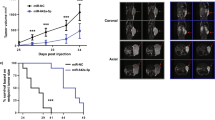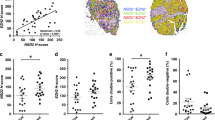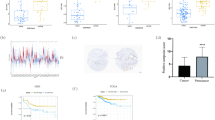Abstract
The purpose of this work was to investigate the role of the ubiquitin–proteasome network (UPN) in prostate cancer (PCA) and to elicit potential markers for this disease. The UPN represents a key factor in the maintenance of cellular homoeostasis as a result of its fundamental function in the regulation of intracellular protein degradation. Members of this network have a role in the biology of haematological and solid tumours. Tumour cells and normal epithelial cells from 22 prostatectomy specimens were isolated by laser microdissection. Prostate biopsy samples from healthy individuals served for technical calibration and as controls. Transcript levels of eight selected genes with E3 ubiquitin ligase activity (labelling target proteins for proteasome degradation) and two genes belonging to the proteasome–multienzyme complex itself were analysed by quantitative real-time RT-PCR. The proteasome genes PSMC4 and PSMB5 and the E3 ubiquitin ligase NEDD4L were significantly and coherently upregulated in PCA cells compared with the corresponding adjacent normal prostate tissue. Transcription of the E3 ubiquitin ligase SMURF2 was significantly higher in organ-confined tumours (pT2) compared with non-organ-confined cancers (pT3). The results indicate a role for PSMC4 and PSMB5 and the E3 ubiquitin ligase NEDD4L in prostate tumourigenesis, whereas SMURF2 downregulation could be associated with clinical progression. NEDD4L and SMURF2 both target transforming growth factor (TGF)-β for degradation. This reflects the pleiotropic role of the TGF-β signalling pathway acting as a tumour suppressor in normal and pre-cancerous cells, but having oncogenic properties in progressing cancer. Further studies have to elucidate whether these alterations could represent clinically relevant PCA-diagnostic and progression markers.
This is a preview of subscription content, access via your institution
Access options
Subscribe to this journal
Receive 4 print issues and online access
$259.00 per year
only $64.75 per issue
Buy this article
- Purchase on Springer Link
- Instant access to full article PDF
Prices may be subject to local taxes which are calculated during checkout




Similar content being viewed by others
References
Schwab M . Ubiquitin. In: Schwab M, (eds). Encyclopedic Reference of Cancer. Berlin, Heidelberg, New York: Springer, 2001. p 937–943.
Zwickl P, Baumeister W . The Proteasome-Ubiquitin Protein Degradation Pathway. Berlin, Heidelberg, New York: Springer, 2002.
Cooper GM . Protein degradation. In: ASM Press Washington DC, (eds). The Cell, A Molecular Approach, 2. ed. Sunderland Massechusetts: Sinauer Associates Inc, 2000; p. 305–309.
Mani A, Gelmann EP . The ubiquitin-proteasome pathway and its role in cancer. J Clin Oncol 2005; 23: 4776–4789.
Burger AM, Seth AK . The ubiquitin-mediated protein degradation pathway in cancer: therapeutic implications. Eur J Cancer 2004; 40: 2217–2229.
Devoy A, Soane T, Welchman R, Mayer RJ . The ubiquitin-proteasome system and cancer. Essays Biochem 2005; 41: 187–203.
Hellwinkel OJ, Rogmann JP, Asong LE, Luebke AM, Eichelberg C, Ahyai S et al. A comprehensive analysis of transcript signatures of the phosphatidylinositol-3 kinase/protein kinase B signal-transduction pathway in prostate cancer. BJU Int 2008; 101: 1454–1460.
Schlomm T, Luebke AM, Sultmann H, Hellwinkel OJ, Sauer U, Poustka A et al. Extraction and processing of high quality RNA from impalpable and macroscopically invisible prostate cancer for microarray gene expression analysis. Int J Oncol 2005; 27: 713–720.
Hanahan D, Weinberg RA . The hallmarks of cancer. Cell 2000; 100: 57–70.
Hershko A, Ciechanover A . The ubiquitin system. Annu Rev Biochem 1998; 67: 425–479.
Pickart CM, Eddins MJ . Ubiquitin: structures, functions, mechanisms. Biochim Biophys Acta 2004; 1695: 55–72.
Deng S, Zhou H, Xiong R, Lu Y, Yan D, Xing T et al. Over-expression of genes and proteins of ubiquitin specific peptidases (USPs) and proteasome subunits (PSs) in breast cancer tissue observed by the methods of RFDD-PCR and proteomics. Breast Cancer Res Treat 2007; 104: 21–30.
Voorhees PM, Dees EC, O’Neil B, Orlowski RZ . The proteasome as a target for cancer therapy. Clin Cancer Res 2003; 9: 6316–6325.
Richardson PG, Barlogie B, Berenson J, Singhal S, Jagannath S, Irwin D et al. Clinical factors predictive of outcome with bortezomib in patients with relapsed, refractory multiple myeloma. Blood 2005; 106: 2977–2981.
Richardson PG, Sonneveld P, Schuster MW, Irwin D, Stadtmauer EA, Facon T et al. Bortezomib or high-dose dexamethasone for relapsed multiple myeloma. N Engl J Med 2005; 352: 2487–2498.
Dreicer R, Petrylak D, Agus D, Webb I, Roth B . Phase I/II study of bortezomib plus docetaxel in patients with advanced androgen-independent prostate cancer. Clin Cancer Res 2007; 13: 1208–1215.
Kane RC, Dagher R, Farrell A, Ko CW, Sridhara R, Justice R et al. Bortezomib for the treatment of mantle cell lymphoma. Clin Cancer Res 2007; 13 (18 Part 1): 5291–5294.
Su Y, Amiri KI, Horton LW, Yu Y, Ayers GD, Koehler E et al. A phase I trial of bortezomib with temozolomide in patients with advanced melanoma: toxicities, antitumor effects, and modulation of therapeutic targets. Clin Cancer Res 2010; 16: 348–357.
Voortman J, Smit EF, Honeywell R, Kuenen BC, Peters GJ, van de Velde H et al. A parallel dose-escalation study of weekly and twice-weekly bortezomib in combination with gemcitabine and cisplatin in the first-line treatment of patients with advanced solid tumors. Clin Cancer Res 2007; 13: 3642–3651.
Kuratomi G, Komuro A, Goto K, Shinozaki M, Miyazawa K, Miyazono K et al. NEDD4-2 (neural precursor cell expressed, developmentally down-regulated 4–2) negatively regulates TGF-beta (transforming growth factor-beta) signalling by inducing ubiquitin-mediated degradation of Smad2 and TGF-beta type I receptor. Biochem J 2005; 386 (Part 3): 461–470.
Lee C, Sintich SM, Mathews EP, Shah AH, Kundu SD, Perry KT et al. Transforming growth factor-beta in benign and malignant prostate. Prostate 1999; 39: 285–290.
Wikstrom P, Bergh A, Damber JE . Transforming growth factor-beta1 and prostate cancer. Scand J Urol Nephrol 2000; 34: 85–94.
Park JI, Lee MG, Cho K, Park BJ, Chae KS, Byun DS et al. Transforming growth factor-beta1 activates interleukin-6 expression in prostate cancer cells through the synergistic collaboration of the Smad2, p38-NF-kappaB, JNK, and Ras signalling pathways. Oncogene 2003; 22: 4314–4332.
Yang J, Wahdan-Alaswad R, Danielpour D . Critical role of Smad2 in tumor suppression and transforming growth factor-beta-induced apoptosis of prostate epithelial cells. Cancer Res 2009; 69: 2185–2190.
Qi H, Grenier J, Fournier A, Labrie C . Androgens differentially regulate the expression of NEDD4L transcripts in LNCaP human prostate cancer cells. Mol Cell Endocrinol 2003; 210: 51–62.
Hu XY, Xu YM, Fu Q, Yu JJ, Huang J . Nedd4L expression is downregulated in prostate cancer compared to benign prostatic hyperplasia. Eur J Surg Oncol 2009; 35: 527–531.
Nonn L, Ananthanarayanan V, Gann PH . Evidence for field cancerization of the prostate. Prostate 2009; 69: 1470–1479.
Lin X, Liang M, Feng XH . Smurf2 is a ubiquitin E3 ligase mediating proteasome-dependent degradation of Smad2 in transforming growth factor-beta signaling. J Biol Chem 2000; 275: 36818–36822.
Fukuchi M, Fukai Y, Masuda N, Miyazaki T, Nakajima M, Sohda M et al. High-level expression of the Smad ubiquitin ligase Smurf2 correlates with poor prognosis in patients with esophageal squamous cell carcinoma. Cancer Res 2002; 62: 7162–7165.
Chen C, Matesic LE . The Nedd4-like family of E3 ubiquitin ligases and cancer. Cancer Metastasis Rev 2007; 26: 587–604.
Fukunaga E, Inoue Y, Komiya S, Horiguchi K, Goto K, Saitoh M et al. Smurf2 induces ubiquitin-dependent degradation of Smurf1 to prevent migration of breast cancer cells. J Biol Chem 2008; 283: 35660–35667.
Nakano A, Koinuma D, Miyazawa K, Uchida T, Saitoh M, Kawabata M et al. Pin1 down-regulates transforming growth factor-beta (TGF-beta) signaling by inducing degradation of Smad proteins. J Biol Chem 2009; 284: 6109–6115.
Jin C, Yang YA, Anver MR, Morris N, Wang X, Zhang YE . Smad ubiquitination regulatory factor 2 promotes metastasis of breast cancer cells by enhancing migration and invasiveness. Cancer Res 2009; 69: 735–740.
Kaminska B, Wesolowska A, Danilkiewicz M . TGF beta signalling and its role in tumour pathogenesis. Acta Biochim Pol 2005; 52: 329–337.
Perttu MC, Martikainen PM, Huhtala HS, Blauer M, Tammela TL, Tuohimaa PJ et al. Altered levels of Smad2 and Smad4 are associated with human prostate carcinogenesis. Prostate Cancer Prostatic Dis 2006; 9: 185–189.
Acknowledgements
We thank the staff of the Laboratory and the Department of Urology of University Hospital Hamburg-Eppendorf, Hamburg, Germany. We express special gratitude to Karin Beutel, Anne Bildhauer, Petra Dase, Hannelore Ellinghausen, Andrea Speckmann and Hannelore Suck for their enthusiasm and excellent technical support. This project was supported by the German Federal Ministry of Education and Science in the framework of the programme for medical genome research (FKZ: 01GS0890 and 01GS08189). We are responsible for the contents of this publication.
Author information
Authors and Affiliations
Corresponding author
Ethics declarations
Competing interests
The authors declare no conflict of interest.
Additional information
Supplementary Information accompanies the paper on the Prostate Cancer and Prostatic Diseases website
Supplementary information
Rights and permissions
About this article
Cite this article
Hellwinkel, O., Asong, L., Rogmann, JP. et al. Transcription alterations of members of the ubiquitin–proteasome network in prostate carcinoma. Prostate Cancer Prostatic Dis 14, 38–45 (2011). https://doi.org/10.1038/pcan.2010.48
Received:
Revised:
Accepted:
Published:
Issue Date:
DOI: https://doi.org/10.1038/pcan.2010.48
Keywords
This article is cited by
-
The role of NEDD4 related HECT-type E3 ubiquitin ligases in defective autophagy in cancer cells: molecular mechanisms and therapeutic perspectives
Molecular Medicine (2023)
-
NEDD4L represses prostate cancer cell proliferation via modulating PHF8 through the ubiquitin–proteasome pathway
Clinical and Translational Oncology (2022)
-
A novel risk score system of immune genes associated with prognosis in endometrial cancer
Cancer Cell International (2020)
-
Downregulation of Smurf2, a tumor-suppressive ubiquitin ligase, in triple-negative breast cancers: Involvement of the RB-microRNA axis
BMC Cancer (2014)
-
Decreased expression of Nedd4L correlates with poor prognosis in gastric cancer patient
Medical Oncology (2012)



